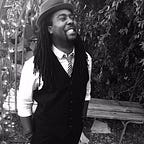Grateful.
In the midst of all the terribleness of the world, I still have to count my blessings. Right now, I am grateful. And I am grateful because I am doing something I never thought I could do.
Short story: My employer offers a lecture series every year, and last fall I was invited to give one of the lectures. (S/O to Gwendolyn Pough — you really are amazing.) It was from the third chapter of my forthcoming book, and I was thinking with Audre Lorde, Rudolf Otto, affect studies, and — in a really shady way — Thomas Aquinas and Aristotle.
Anyway, this past spring, one of my undergrads (a brilliant young black woman) told me that one of her other professors remarked that my work “sounds more like black studies than religion.”
I smiled. Hearing that made my day.
Don’t get me wrong: I love being in religion. I didn’t smile because I no longer want to do religious studies anymore. I do. I was trained in religious studies, after all; it’s how I think.
But I was happy because ever since I encountered thinkers like Fred Moten, Christina Sharpe, Saidiya Hartman, Ashon Crawley, and Alex Weheliye, I wanted to do what they do. I wanted to find a way to think ethically and philosophically explore black life, and to do so with some of the most beautiful writing I’d encountered in the academy. These thinkers were doing this.
They still are.
Initially, I didn’t have the language for what these thinkers — and so many others — were and are doing. I didn’t know that what they did was called black studies. I just knew that I wanted to do what they were doing. I just knew that the way they thought and wrote — the way their writing is itself a form of thinking—made me want to do the same.
In short, these scholars made me want to do black studies, to try and think with them in ways that might help me think through my own concerns and commitments.
And to do so with an eye toward (deconstructing) religion.
We often think of black studies and black religious studies as different. And to be clear, there are differences; much of black studies leaves the question of religion by the wayside, while much of black religious studies struggles to grapple with the insightful and incisive analyses black studies thinkers provide.
But, truthfully, the divide isn’t as sharp as it seems at first glance. At least since Ashon Crawley published Blackpentecostal Breath, the gig has been up (and it starts much earlier than that — Hortense Spillers wrote widely on black preaching, for example, and some of the earliest thinkers in black studies — Du Bois, Woodson, Hurston, Cooper, Larsen, Wright, and so on — engaged with religious life and experience). But, at least for me, that text opened something up that I didn’t know was possible.
And then I read Habeas Viscus.
And then I read “Blackness and Nothingness.”
And then I read In the Wake.
And I was hooked. Each of these texts did so much for me, vivified my thinking, allowed for me to think with my training in ways I couldn’t have foreseen. And I am so thankful for it.
And I’m also so incredibly thankful that many of these scholars have embraced me and my work. There is something so generative about black studies. And that generativity has made my work so much better.
Of course, there are fights. Afropessimist thought doesn’t jive well with what we have come to call black optimist thinking. And that’s just the most prominent line of disagreement. But, for me anyway, that disagreement is still fruitful, still generative, still vivifying in the way that it challenges me to be sharper, to contend with the ethical dimensions of my claims. In short, even the disagreements help me to be a better thinker. And I hope this sharpening will help contribute to something like a better life for black people.
I can’t guarantee that. I’m not naive enough to foster an uncritical hope. Last semester, my undergrads told me I was an afropessimist, which surprised me, because I’m sure those who do afropessimist work probably wouldn’t agree. But that’s the thing — even if I’m not an afropessimist, I’ve learned so much from that line of thinking. It makes me think twice, holds my ethical feet to the fire. And for that, I am grateful.
I guess what I’m trying to say is this: 5 years ago, I wanted to do black studies.
Now, I can say without hesitation that I am a black studies scholar. And being a black studies scholar makes me an even better religious studies scholar. I think with both. And now, I can’t imagine doing it any other way.
I apologize if this piece feels self-serving. If it is too much, please know that I write this piece from a place of joy, cultivated in and through the sociality that has been extended to me by people I do and do not know.
But, if you’ll indulge me just one more time, another short story: yesterday, I was talking to a friend on the phone. They were at a workshop that was dealing with race and religion, and they told me that my name had come up (in a good way), that people were looking forward to Black Life Matter coming out.
I smiled again.
I was grateful.
I am grateful.
